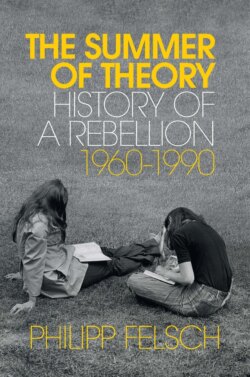Читать книгу The Summer of Theory - Philipp Felsch - Страница 11
1 FEDERAL REPUBLIC OF ADORNO
Оглавление3 Peter Gente goes to the cinema, 1956.1
While Radio Free Berlin was broadcasting Nikita Khrushchev’s secret speech, Peter Gente went to the cinema. As the radio waves rose into the evening sky, informing listeners on both sides of the divided city about the crimes of Stalinism, the curtain opened on Beauties of the Night, a comedy by René Clair about a young composer escaping into dreams of success and beautiful women, losing his connection to reality – until the end of the film, when he comes to his senses just in time to face real life.2 Gente was ecstatic, and gave the film a grade of ‘1+’ in his culture diary. He went to the cinema often in those days, and also visited Berlin’s theatres, concert halls and cultural centres. He had discovered his passion for culture after moving with his parents to the metropolis from the Soviet-occupied provinces. He began reading novels with the zeal of a late bloomer, and invested what money he earned at his summer jobs in admission tickets.3 Herbert von Karajan was the director of the Berlin Philharmonic. The Berliner Ensemble was an unbeatably affordable theatre at the unofficial exchange rate between Western and Eastern marks, and Brecht himself still watched from his box. And the cinemas showed films from France and Italy that broke with the aesthetics of the pre-war generation.4 On the eve of the Nouvelle Vague, Gente surrendered to the spells of Fellini, Hitchcock, Orson Welles and Jean Cocteau. ‘Read bourgeois novels; consumed culture generally’ was his summary of this period in a later self-criticism before his socialist comrades.5
Karl Marx once commented that the Germans are philosophically contemporary with the present day, but not historically.6 In Gente’s life too, major political events were only background noise. Although he lived at the epicentre of the Cold War, he hardly seems to have noticed Khrushchev’s speech, which heralded a thaw in the East and a disenchantment among the intellectual left in the West.7 But perhaps Berlin was precisely the wrong place to develop a stable sense of reality. There were too many realities coexisting here: the ruins of the World War, and the monuments of the post-war economic miracle; the Kurfürstendamm in the West with its cafés full of buttercream cakes, and the Stalin-Allee in the East with its socialist gingerbread housing blocks. To Maurice Blanchot, whom Gente later counted among his favourite authors, Berlin ‘was not … just one city, or two cities’, but ‘the place in which the question of a unity which is both necessary and impossible confronts every individual who resides there, and who, in residing there, experiences not only a place of residence but also the absence of a place of residence’.8
This is what it sounds like when a geopolitical situation invites metaphysical speculation. But, in 1956, Gente did not yet see the world in the light of theory. In a round script that betrays his youth, he kept a record of his evenings at the cinema and the theatre, and the minimalistic prose of his lists seems to quiver with pent-up desire. Gente was burning to find a place for himself in the world of the arts,9 and his readings soon influenced him to limit his search to the canon of high culture. In the year of the thaw, however, his taste had not yet matured. His diary mixes musicals with auteur cinema, Puccini with Hollywood and Brecht. It was up to him to discover a common denominator. In the meantime, he awarded the performances grades from 1 to 5 – the scale used by German secondary schools, including the one he had recently left. The numbers were a relatively modest instrument of cultural criticism, taking no notice of highbrow or lowbrow categories. At the same time, Susan Sontag, negligibly older, was already jotting savvy mini-reviews in her diary as she made her own cultural rounds in Chicago.10 Gente’s marks went no higher than the superlative ‘1++’ for Giorgio Strehler’s adaptation of Harlequin, Servant of Two Masters, performed by the visiting Piccolo Teatro of Milan, and no lower than the moderate ‘3’ for Puccini’s La Bohème. He was an easy grader who repeatedly had to expand his scale upwards because, worshipper of culture, he had started out awarding too many 1s.
